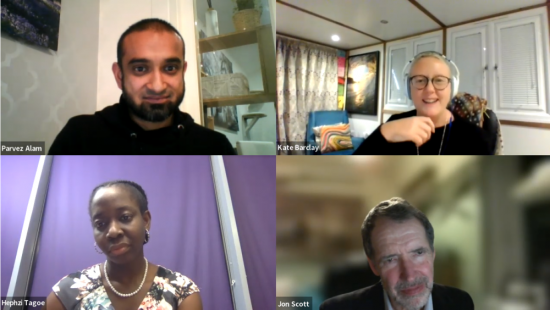News
RSB asks in their most recent Policy Lates event: what bioscience skills are needed?
- Details
- 25 November 2022
Wednesday’s latest event in the RSB’s Policy Lates series brought together sector leaders to discuss perspectives on what bioscience skills are needed for the future, and how scientists can be inclusive of, and responsive to, the values of the global society, from a panel of experts.

Biological research and innovation are evolving. New ways of doing biological science, enabled by advanced digital technologies, systems thinking, and engineering biology, for example, are emerging.
This is alongside new expectations for the sector to address challenges for health, sustainable development and economic benefit.
The next generation of bioscientists need the skills to tackle the sector's future challenges. According to a 2018 Nuffield report, only 32% of UK bioscience undergraduates go on to work in the sector. Promoting transferrable skills and increasing emphasis on inter-, multi- and trans-disciplinary work can push discoveries to new frontiers.
The event, chaired by Professor Jon Scott FRSB, professor of bioscience education at the University of Leicester and chair of the RSB's Education and Science Policy Committee, was held online and delivered with support from the RSB’s Policy Lates Working Group.
Dr Parvez Alam FRSB, opened the panel by discussing emerging technologies and interdisciplinary science. He noted that as humans we create our definitions of the world in the ways we see fit and the systems we live in channels us and our independent way of thinking, allowing us to make better sense of the world we live in and all of its complexities.
Speaking about his own research on tree-climbing fish, the mudskipper, Periophthalmus variabilis, he noted: “The research ended up requiring our utility of decades of invention and innovation in the form of engineering tools, alongside an interdisciplinary team, consisting of biologists, physicists, chemists and material scientists – we do need each other.”
Dr Hephzi Tagoe, founding director of GhScientific, went on to talk about skills for societally engaged and responsive science. She touched on science communication and how messaging can sometimes become complex when you engage with different communities. Her solution at GhScientific is to use messaging that combines concepts of all scientific disciplines to reach a wide range of audiences.
Dr Kate Barclay, skills strategy consultant at UKBIA, spoke about the skills needed for a sustainable bioeconomy. She discussed the need for over 133,000 jobs in the life sciences by 2030 and the current demand for skills.
Kate commented: “If we are going to have a sustainable bioeconomy, we really need to think about investment, but also we need to make sure the skills that are coming through can really look at new technologies and also look at the new routes that can generate new careers into science.”
During the audience Q&A the panellists discussed the opportunities biology can provide for the world’s biggest challenges, the benefits of gaining skills through apprenticeships and the importance of critical thinking.
This event was run with support from the Policy Lates Working Group: Applied Microbiology International, the British Pharmacological Society, the Society for Experimental Biology, and The Physiological Society.
The event is available to watch on the RSB’s YouTube channel.

